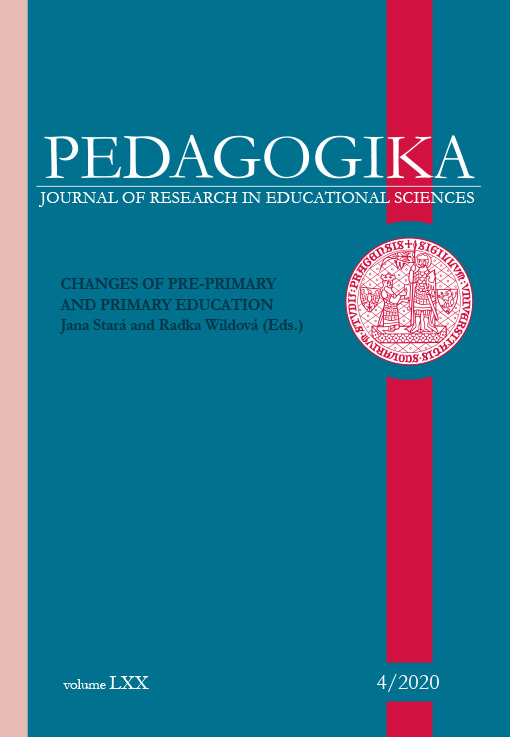Od Juhu na Sever v globalizovanom svete starostlivosti a vzdelávania v ranom detstve: Diverzita národných a lokálnych reakcií vo vybraných krajinách
DOI:
https://doi.org/10.14712/23362189.2020.1682Abstrakt
Štúdia analyzuje procesy neoliberálnej transformácie sektoru starostlivosti a vzdelávania v ranom detstve (VSRD) v piatich vybraných krajinách (Nemecko, Slovensko, Indonézia, Nepál a Keňa). Ide tak o krajiny globálneho Severu ako aj krajiny globálneho Juhu. Uvedené krajiny sú vybrané na základe výskumnej angažovanosti autorov v nich resp. na základe dlhodobých osobných skúseností s uvedenými systémami VSRD. Nadobudnuté poznanie umožňuje hlbšie preniknúť do detailov stretu daných systémov VSRD s neoliberálnymi vzdelávacími politikami a opísať diferencie v procesoch adaptácie daných krajín na nové politiky. Štúdia ukazuje, že neoliberálne vzdelávacie politiky implikujú rôzne typy adaptačných reakcií a že dopady na sektor VSRD môžu byť veľmi rozdielne – od výmeny konceptov, systémovej konvergencie, praktickej rezistencie až po úplné ovládnutie sektoru. Štúdia tak prispieva k diferencovanejšiemu chápaniu pôsobenia ekonomizovaného diskurzu na národné systémyVSRD.
Klíčová slova: vzdelávanie a starostlivosť v ranom detstve, sociálno-investičný prístup, Európska únia, Nemecko, Slovensko, Indonézia, Keňa, Nepál, globálny Sever, globálny Juh
Reference
Adriany, V., & Saefullah, K. (2015). Deconstructing human capital discourse in early childhood education in Indonesia. In T. Lightfoot-Rueda & R. L. Peach (Eds.), Global perspectives on human capital in early childhood education. Critical cultural studies of childhood (pp. 159-179). New York: Palgrave Macmillan.
https://doi.org/10.1057/9781137490865_9
Arndt. S., Tesar, M., Pupala, B., Kaščák, O., & Mbugua, T. (2016). Re-Negotiating an ethics of care in Kenyan childhoods. Human Affairs, 26(3), 288-303.
https://doi.org/10.1515/humaff-2016-0025
Casalini, B. (2014). The Early Childhood Education and Care Policy debate in the EU. Interdisciplinary Journal of Family Studies, 19(1), 77-94.
Clausen, S. B. (2015). Schoolification or early years democracy? A cross-curricular perspective from Denmark and England. Contemporary Issues in Early Childhood, 16(4), 355-373.
https://doi.org/10.1177/1463949115616327
European Commission. (2011). Early childhood education and care: Providing all our children with the best start for the world of tomorrow. Brussels: European Commission.
Fangmeyer, A., & Kaščák, O. (2016). Transgressionen: Zum diskursiven Rekonfigurieren von institutionalisierten (frühen) Kindheiten. Ein slowakisch¬deutscher Vergleich von curricularen Dokumenten. In I. Nentwig-Gesemann, K. Fröhlich-Gildhoff, T. Betz, & S. Viernickel (Eds.), Forschung in der Frühpädagogik 9 (pp. 141-172). Freiburg: FEL.
Frindte, A., & Mierendorff, J. (2017). Bildung, Erziehung [education] and care in German early childhood settings - spotlights on current discourses. Journal of Pedagogy, 8(1), 99-120.
https://doi.org/10.1515/jped-2017-0005
Gay, G. (2000). Culturally responsive teaching: Theory, research and practice. New York: Teachers College Press.
Gisbert, K. (2004). Neue Bildungsinhalte. In I. Wehrmann (Ed.), Kindergärten und ihre Zukunft (pp. 138-148). Weinheim: Beltz.
Gupta, A. (2006). Early childhood education, postcolonial theory, and teaching practices in India: Balancing Vygotsky and the Veda. New York: Palgrave Macmillan US.
https://doi.org/10.1057/9780312376345
Jones, P. (2010). The politics of the economics of education in the European Union. European Educational Research Journal, 9(3), 359-380.
https://doi.org/10.2304/eerj.2010.9.3.359
Kaščák, O., & Pupala, B. (2012). Škola zlatých golierov: Vzdelávanie v ére neoliberalizmu [Golden Collar School: Education in the Era of Neoliberalism]. Prague: SLON.
Kaščák, O., Pupala, B., & Mbugua, T. J. (2016). Slovak preschool curriculum reform and teachers' emotions: An analysis of Facebook posts. Early Childhood Education Journal, 44(6), 573-580.
https://doi.org/10.1007/s10643-015-0741-2
Kenya Institute of Education. (2008). Handbook for Early Childhood Development Education Syllabus. Nairobi: Kenya Institute of Education.
Khanal, S.K., Paudyal, B.R., & Dangal, S. (2017). Early childhood development policies in Nepal: Achievements, learning, and implications. In H. Li, E. Park, & J. Chen (Eds.), Early Childhood Education Policies in Asia Pacific. Education in the Asia-Pacific Region: Issues, Concerns and Prospects, vol. 35 (pp. 135-161). Singapore: Springer.
https://doi.org/10.1007/978-981-10-1528-1_7
Mbugua, T. (2004). Early childhood care and education in Kenya. Childhood Education, 80(4), 191-197.
https://doi.org/10.1080/00094056.2004.10522230
Mbugua, T., Pupala, B., Kascak, O., & Petrova, Z. (2018). Transforming Public education in Kenya: Early childhood development and education in Kwale County. In C. S. Sunal & K. Mutual (Eds.), Transforming public education in Africa, the Caribbean, and the Middle East (pp. 53-71). Charlotte, North Carolina: Information Age Publishing.
Mierendorff, J. (2014). Annäherungen von Kindergarten und Schule. Wandel früher Kindheit? In P. Cloos, K. Hauenschild, I. Pieper, & M. Baader (Eds.), Elementar- und Primarpädagogik. Internationale Diskurse im Spannungsfeld von Institutionen und Ausbildungskonzepten (pp. 23-37). Wiesbaden: Springer.
https://doi.org/10.1007/978-3-658-03811-3_3
Millei, Z., Gobby, B., & Gallagher, J. (2017). Doing state policy at preschool: An autoethnographic tale of universal access to ECEC in Australia. Journal of Pedagogy, 8(1), 33-55.
https://doi.org/10.1515/jped-2017-0002
Ministry of Education, Science and Technology. (2015). National curriculum policy. Nairobi: Ministry of Education, Science and Technology.
Moss, P. (2008). what future for the relationship between early childhood education and care and compulsory schooling? Research in Comparative and International Education, 3(3), 224-234.
https://doi.org/10.2304/rcie.2008.3.3.224
Moss, P. (2009). There are alternatives! Markets and democratic experimentalism in early childhood education and care. Working papers No. 53. Hague: Bernard van Leer Foundation.
Nicaise, I., & Schepers, W. (2013). Social investment: the new paradigm of EU social policy? Belgisch Tijdschrift voor Sociale Zekerheid, 55(2), 189-230.
Paananen, M., Lipponen, L., & Kumpulainen, K. (2015). Hybridisation or ousterisation? The case of local accountability policy in Finnish early childhood education. European Educational Research Journal, 14(5), 395-417.
https://doi.org/10.1177/1474904115601446
Pupala, B., Kaščák, O. & Tesar, M. (2016). Learning how to do up buttons: Professionalism, teacher identity and bureaucratic subjectivities in early years settings. Policy Futures in Education, 14(6), 655-665.
https://doi.org/10.1177/1478210316642675
Schreiber, N. (2009). Die Einführung der neuen Bildungspläne in Kindertageseinrichtungen - Ergebnisse von Begleitstudien in drei Bundesländern. Diskurs Kindheits- und Jugendforschung, 4(3), 431-437.
Sims, M., & Pedey, K. (2015). Are we travelling a similar path to early childhood professionalization? The case of Bhutan. International Journal of Innovation and Research in Educational Sciences, 2(3), 218-226.
Ständige Konferenz der Kultusminister der Länder in der Bundesrepublik Deutschland. (2004). Gemeinsamer Rahmen der Länder für die frühe Bildung in Kindertageseinrichtungen. Bonn/Berlin: KMK.
Upreti, N. (2013). National plan and policies for early childhood education and care in Nepal. Child Research Net. Section: Asia, ECEC around the World, Reports from around the World. Retrieved from www.childresearch.net/projects/ecec/2013_05.html



